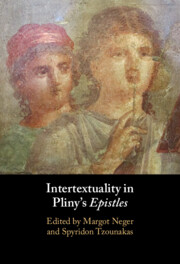Book contents
- Intertextuality in Pliny’s Epistles
- Intertextuality in Pliny’s Epistles
- Copyright page
- Contents
- Contributors
- Acknowledgements
- Abbreviations
- Introduction
- Part I Intertextuality and Interdiscursivity in Pliny’s Letters
- Chapter 1 Pliny, Man of Many Parts (Lucretius, Cicero, Valerius Maximus, Tacitus)
- Chapter 2 Intertextuality in Pliny, Epistles 6
- Chapter 3 Discourses of Authority in Pliny, Epistles 10
- Part II Models and Anti-Models: Pliny’s Interaction with Oratory and Natural History
- Part III Pliny and Seneca: Discourses of Grief and Posthumous Reputation
- Part IV Pliny’s Villas and Their Poetic Models
- Part V Pliny Turns Nasty: Satire and the Scoptic Tradition
- Part VI Final Thoughts: Discourses of Representation and Reproduction
- Bibliography
- General Subject Index
- Index Locorum
Chapter 3 - Discourses of Authority in Pliny, Epistles 10
from Part I - Intertextuality and Interdiscursivity in Pliny’s Letters
Published online by Cambridge University Press: 07 September 2023
- Intertextuality in Pliny’s Epistles
- Intertextuality in Pliny’s Epistles
- Copyright page
- Contents
- Contributors
- Acknowledgements
- Abbreviations
- Introduction
- Part I Intertextuality and Interdiscursivity in Pliny’s Letters
- Chapter 1 Pliny, Man of Many Parts (Lucretius, Cicero, Valerius Maximus, Tacitus)
- Chapter 2 Intertextuality in Pliny, Epistles 6
- Chapter 3 Discourses of Authority in Pliny, Epistles 10
- Part II Models and Anti-Models: Pliny’s Interaction with Oratory and Natural History
- Part III Pliny and Seneca: Discourses of Grief and Posthumous Reputation
- Part IV Pliny’s Villas and Their Poetic Models
- Part V Pliny Turns Nasty: Satire and the Scoptic Tradition
- Part VI Final Thoughts: Discourses of Representation and Reproduction
- Bibliography
- General Subject Index
- Index Locorum
Summary
In this chapter, König examines an array of ‘literary interactions’ in Pliny’s 10th book of Letters. She draws particular attention to the book’s ‘heteroglossia’ – the multiplicity of linguistic registers and literary genres that it evokes and adopts – and she shows how that heteroglossia enables Pliny to accrue increasing authority and expertise as the book progresses. Starting with letters 10.1-14, she first explores intertexts between Pliny’s correspondence with Trajan and other close-contemporary literature (in particular, the Panegyricus and Frontinus’ De Aquis). Her focus then shifts to Pliny’s incorporation of a range of specialist discourses (architectural, religious, legal, financial, hydraulic, etc.) across the rest of the book, discourses which gradually flesh out his credentials as an administrator with the ability to command many different areas of government. She ends by exploring Pliny’s interaction with Trajan via an allusion to Pliny the Elder’s address to Titus at the start of his encyclopaedic Natural History. In drawing attention to the range and impact of different kinds of intertexts across Letters 10 – from specific textual allusions to generic interdiscursivity – she underlines what this seemingly ‘administrative’ correspondence can teach us about Roman reading and writing habits and the blurred boundary between ‘literary’ and non/less-‘literary’ texts.
Keywords
- Type
- Chapter
- Information
- Intertextuality in Pliny's Epistles , pp. 67 - 96Publisher: Cambridge University PressPrint publication year: 2023
- 1
- Cited by

